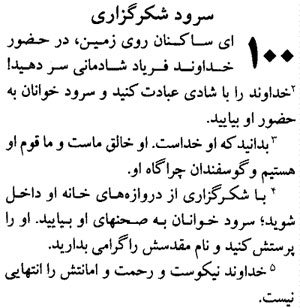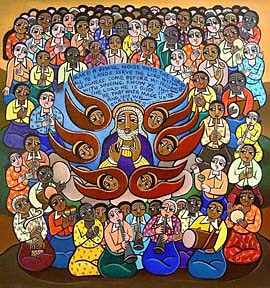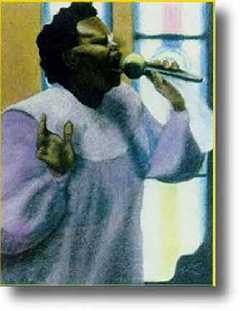Global Joy for "All Ye Lands"
For Sunday November 20, 2005
Lectionary Readings (Revised Common Lectionary, Year A)
Ezekiel 34:11–16, 20–24
Psalm 100 or Psalm 95:1–7a
Ephesians 1:15–23
Matthew 25:31–46
 |
"Enter His Gates". |
I have not cracked the cover of my King James Version of the Bible for ages, but this week I blew the dust off its pages to enjoy the majestic cadences of its sacred poetry. There were translations of the Bible into English long before the KJV, the first of which was by John Wycliffe in 1382, but none have been more influential. Commissioned in 1604 and completed in 1611, the KJV has shaped our entire English-speaking language and culture even down to today. As the Oxford theologian Alister McGrath puts it, "Without the King James Bible, there would have been no Paradise Lost, no Pilgrim's Progress, no Handel's Messiah, no Negro spirituals, and no Gettysburg Address."1 Even our church jokes witness to its legacy of allegiance: "If it was good enough for Saint Paul, it's good enough for me."
Thus, from the lectionary readings for this week, here is the most familiar and favorite of all Psalms, in the most influential of all English translations:
Make a joyful noise unto the Lord, all ye lands.
Serve the Lord with gladness;
come before his presence with singing.
Know ye that the Lord, he is God.
It is he who hath made us, and not we ourselves;
we are his people, and the sheep of his pasture.
Enter into his gates with thanksgiving, and into his courts with praise.
Be thankful unto him,
and bless his name.
For the Lord is good.
His mercy is everlasting,
and his truth endureth to all generations.
 |
Farsi translation of Psalm 100. |
I suspect that these lines will provoke some residual memory even for people who are unfamiliar with the Bible. But for believers the Bible is more than an object of literary analysis or historical curiosity, however beautiful. We read the Bible not merely for religious information, or even for inspiration, but for personal transformation. We read Scripture not as an object over which we stand, but in a manner in which we construe ourselves as objects and the Bible as the subject of God's address to us. Just what does this classic poem of Hebrew history say to us?
In a world riven with wars, starvation, HIV-AIDS, inequities of all sorts, and preventable suffering, perhaps nothing is more radical or counter-cultural than to live with joy, gladness, praise and gratitude. The psalmist strikes a confident chord for us who live in an age of justifiable fears and apprehensions. His purview is global, too, rather than parochial. Originating from an ancient writer of a geo-politically marginal people, I am always amazed at the cosmic scale of this Hebrew poetry. The psalmist calls every person in every time and place—"all ye lands"—to offer thanksgiving, singing and grateful devotion to Yahweh. His verse pushes us beyond all ethnocentric boundaries to embrace every "other," and beyond every egocentric preoccupation to worship only God.
The source of confident joy and joyful confidence originates in the fundamental acknowledgement that "the Lord, he is God. It is He who hath made us and not we ourselves; we are His people, and the sheep of His pasture." Turning from divine praise to human dignity, the Psalmist celebrates the good news that we are neither alone nor autonomous. He confesses that God fashioned every single person, and that therefore every human being enjoys an inherent worth that can never be earned or even lost, and that therefore we enjoy His bountiful care. Many people, of course, do not view the world or people this way, and herein lies a great divide between two very different ways of experiencing life itself.
 |
Psalm 100 by Laura James. |
Some prominent voices in our culture, many of which speak in the name of science, object to the so-called "speciesism" that the psalmist endorses. The British mathematician and Nobel laureate Bertrand Russell (1872–1970) once wrote, "Since Copernicus, it has been evident that Man has not the cosmic importance which he formerly arrogated to himself. No man who has failed to assimilate this fact has a right to call his philosophy scientific." More recently, in his book The Selfish Gene (1976) the outspoken atheist and zoologist Richard Dawkins of Oxford objects to the idea that the human species might claim any special moral consideration as compared with other species. Misguided religious zealots might believe that ancient superstition, says Dawkins, but it "has no proper basis in evolutionary biology." Here in America, Peter Singer (b. 1946) of Princeton has forcefully argued against what he considers a stubborn, dogmatic religious prejudice, the belief that the human species enjoys a special place in the cosmos.2
To the extent that the conclusions of Russell, Dawkins and Singer are unremittingly secular and atheistic, and I think they are, I agree with Huston Smith who in his new book The Soul of Christianity (2005) objects that their "scientistic" worldview has been "disastrous for the human spirit." For many thoughtful people, Christian and otherwise, the promise of "endless progress through the technological application of continuous scientific discovery" reads like a "cruel joke" this century. Furthermore, I suspect that most people find the materialist reduction of human life to empirical science emotionally bleak and unsatisfying. The English poet Christina Rossetti (1830–1894) is on to something when she observes that "were there no God, we would be in this glorious world with grateful hearts and no one to thank." Gratitude of necessity requires an object or recipient. Ultimately, Russell, Dawkins, and Singer have no "One" to thank. Finally, it is true that some people have misappropriated the idea that human beings bear a special divine dignity in ways that have resulted in domination and exploitation of the earth. Singer and others like him rightly warn us of that danger. But the psalmist insists that our posture is one of gratitude and service, not arrogant self-aggrandizement.
 |
Psalm 100:1. |
Long ago Kierkegaard, who died 150 years ago on November 11, 1855, warned of the encroachment of scientific specialization that failed to limit itself to the world of "plants and animals and stars," and instead threatened to "annex" the world of the soul or spirit. In contrast, he advocated a worldview that echoes Psalm 100: "If at every moment, both present and future, it were eternally certain that nothing has happened or can ever happen, not even the most fearful horror invented by the most morbid imagination and translated into fact, which can separate us from God's love—here would be reason for joy." Jubilate deo—the first two words of this Psalm in Latin, "make a joyful noise unto the Lord"—celebrates a good God whose "mercy is everlasting," without limits or conditions. Believing this, we offer to Him grateful hearts this Thanksgiving.
For further reflection:
* Is there a difference between joy and happiness?
* Recall people who have exemplified a spirit of gratitude and joy.
* When and why have you ever been truly joyful?
* Is gratitude a lost virtue today, and if so how do we recover it?
* Just how influential are the voices of famous atheists like Russell, Dawkins and Singer?
[1] Alister McGrath, In the Beginning; The Story of the King James Bible and How It Changed a Nation, a Language, and a Culture (New York: Anchor, 2002); cf. too Adam Nicolson, God's Secretaries; The Making of the King James Bible (New York: Harper Collins, 2003).
[2] Peter Singer, http://www.utilitarian.net/singer/by/200410--.htm.





